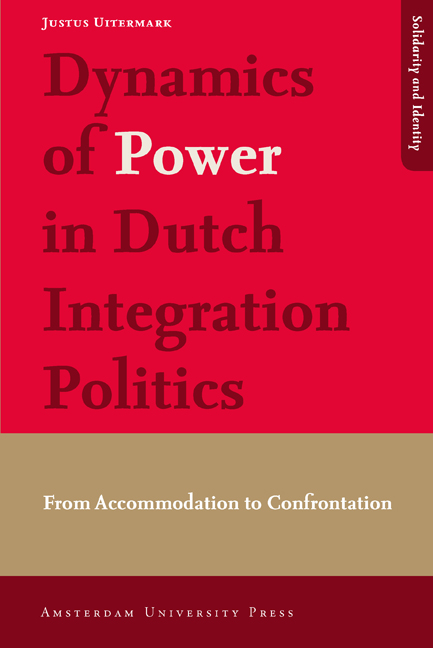13 - Conclusion: The Dynamics of Power
Published online by Cambridge University Press: 15 January 2021
Summary
The political scientist Arend Lijphart (1968) famously used the Netherlands as the quintessential example of how a democracy could remain stable in spite of considerable differences between population groups. Today the Netherlands is exemplary of how a seemingly stable political constellation can drastically change. The Netherlands moved from accommodation to confrontation, and the contention over integration was key to this process. It is tempting to understand these political transformations as if they were a change in personality. We would then need to find out why ‘the Dutch’ turned from tolerant to conservative. But such an approach would wrongly assume that ‘the Dutch’ share the same outlook, which they then collectively changed. This is clearly not the case; the views on the multicultural society as reported in surveys have been remarkably stable over the period under investigation. The lingua franca of comparative research on integration politics also doesn't help to grasp the changes. In this lingo, the Netherlands moved from “multiculturalism” to “assimilationism”. However, the image of a coherent model that moves from one pole (multiculturalism) to another (assimilationism) does not adequately capture the contentious dynamics of integration politics. To think in terms of a shift requires us to overemphasize one particular development at the expense of others. Instead of a simple shift – where one discourse gradually grows more powerful and engulfs the totality of society – there has been a proliferation of integration politics where different actors push in different directions. To answer the question posed at the outset – How and why did power relations transform in Dutch integration politics between 1980 and 2006? – we had to develop an approach that could capture the contentious dynamics of power within integration politics. I argued that we needed to identify the milieus where the culturalists’ challenge originated, the resources they mobilized, the coalitions they formed and the effects they produced. In short, we needed a field analysis that dissects the forces operating in integration politics. This chapter summarizes the results of this analysis in the first two sections and then moves on to discuss the broader relevance of the study. The Netherlands is not unique and the patterns observed in this particular case may be more universally relevant to polities and fields where challengers confront established ways of doing and speaking.
- Type
- Chapter
- Information
- Dynamics of Power in Dutch Integration PoliticsFrom Accommodation to Confrontation, pp. 247 - 264Publisher: Amsterdam University PressPrint publication year: 2013



